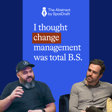
Navigating IPOs and Acquisitions: GC Gary Spiegel Takes Us Behind the Scenes
Enabling a successful IPO is an important milestone in a GC’s career. For Gary Spiegel, it was a passion he’d pursued ever since he transitioned from the regulatory world into Silicon Valley.
Join us as Gary takes us behind the scenes into his experience:
-navigating two acquisitions in two years, from MySQL to Sun Microsystems to Oracle,
-fulfilling his dream of becoming an IPO GC at Anaplan,
-helping them again go private in a blockbuster acquisition by Thoma Bravo.
Along the way, we’ll also discuss what goes into building large legal teams and setting them up for success, finding growth opportunities within legal as well as other functional areas, and more.
This is an episode you don’t want to miss.
Read detailed summary: https://www.spotdraft.com/podcast/episode-8
Topics:
Introduction: 00:00
Gary’s start with regulatory law and shift to the business side: 01:32
The journey from MySQL to Sun Microsystems to Oracle through multiple acquisitions: 06:58
Supporting a company as its first GC and taking over the legal function from the CFO: 15:54
The right time to join a company as the first legal hire or GC: 22:22
Behind the scenes to Anaplan's successful IPO: 27:18
Thoma Bravo's acquisition of Anaplan and Legal’s role in ensuring success: 33:54
Building a team of 20+ people and setting them up for success: 37:16
Communicating the value of legal within the business: 43:00
Leveraging legal expertise as a springboard into other roles: 49:18
Strategies for managing stakeholder relationships and balancing legal support: 52:00
The future of in-house legal roles: 56:56
Connect with us:
Gary Spiegel - https://www.linkedin.com/in/gspieg/
Tyler Finn - https://www.linkedin.com/in/tylerhfinn
SpotDraft - https://www.linkedin.com/company/spotdraft
SpotDraft is a leading CLM platform that solves your end-to-end contract management issues. Visit https://www.spotdraft.com to learn more.



















